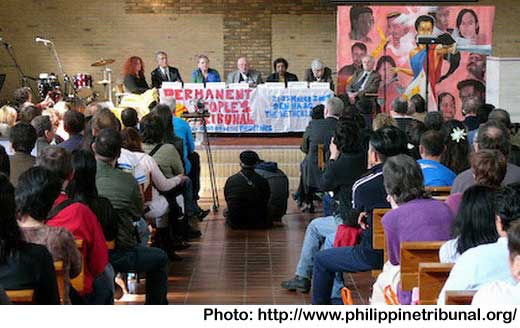 Permanent
Peoples’ Tribunal
Permanent
Peoples’ Tribunal
ARROYO GUILTY OF CRIMES AGAINST
HUMANITY
Tribunal Verdict to be transmitted to the UN, ICJ and European
Parliament
26 March 2007, The Hague, The Netherlands — In a 13-page verdict read before about 300 people inside a church in this city March 25, the Permanent Peoples’ Tribunal (PPT) found both Philippine President Gloria M. Arroyo and U.S. President George W. Bush, Jr. and their respective governments as responsible for gross and systematic violations of human rights, economic plunder and transgression of the Filipino people’s sovereignty.
The verdict, read at the conclusion of the five-day second session on the Philippines by Francois Houtart, Session President, described the extrajudicial killings, forced disappearances, massacres, torture and other atrocities allegedly committed by the Arroyo government as “crimes against humanity”. Such violations which the PPT said were in no way justified as “necessary measures against terrorism”, must be stopped immediately.
In a cultural program held right after the verdict was read, Senator Jamby Madrigal said the Tribunal’s judgment will dispel the claims of the Arroyo government that there is democracy in the Philippines. The senator, who spoke as a resource person during the tribunal proceedings, said that the country is now ruled by a military junta with Mrs. Arroyo acting only as a figurehead.
The concluding part of the Tribunal took place at the Pax Christikerk in The Hague. The Hague is the Netherlands’ seat of government and the world’s center of international law. It hosts the International Court of Justice (ICJ), the new International Criminal Court (ICC) of the Rome Statute of 1998, and the International Criminal Tribunal for the Former Yugoslavia (ICTFY) that tried Milosevic, the deposed president of Yugoslavia for war crimes.
The Tribunal, composed of six internationally–eminent persons, also named the Armed Forces of the Philippines (AFP), as having “a central role” in the atrocities, adding that the military is “a structural component and instrument of the policy of the ‘war on terror’ in the Philippines” declared by both Arroyo and Bush, Jr.
The verdict was rendered after three continuous session days that heard the testimonies of witnesses of political killings and abductions, expert testimonies and boxes of documents, and other evidences to support three major charges against the two governments. The charges were on: violations of the Filipino people’s civil and political rights; economic, political, and cultural rights; and violations of the people’s rights to national self-determination and national liberation.
The number of victims of extrajudicial killings in the Philippines has reached 839 this week. Hundreds of others were victims of frustrated murders and abductions, widely believed to be perpetrated by government security forces. This report has been confirmed by the UN Special Rapporteur on extrajudicial, involuntary or summary executions, and by the government–created Melo Commission.
In the Tribunal, several testimonies of eyewitnesses, experts and resource persons were heard live through tele–video conference with Manila, with questions tossed by members of the Tribunal’s jury.
Those who gave depositions and testimonies either in person or through video hook-up included Marie Hilao–Enriquez, secretary general of human rights alliance Karapatan; Dr. Constancio “Chandu” Claver, victim of frustrated murder; Dr. June P. Lopez, an expert in handling torture and trauma victims; Navy Capt. (ret.) Danilo Vizmanos; UP Faculty Regent Prof. Roland Simbulan; Bishop Elmer Bolocon of the UCCP and Ecumenical Bishops Forum (EBF); Elmer Labog, chair of Kilusang Mayo Uno (KMU); and Danilo Ramos of the Kilusang Magbubukid ng Pilipinas (KMP).
Senator Madrigal also appeared before the PPT as resource person on the environment.

Aside from Houtart, who is from Belgium and Director of the Centre Tricontinental (Cetri), the PPT jurors included Oda Makoto (Japan), well-known novelist and social activist; Ties Prakken (The Netherlands), professor in criminal law Maastricht University; Oystein Tveter (Norway), lawyer and former Director of the Karibu Foundation and former foreign ministry official in South Africa and Zambia; Irene Fernandez (Malaysia), lawyer, social development expert and head of Tenaganita; and Lilia Solano (Colombia), 2005 Right Livelihood Awardee (alternative Nobel) and Director of Project for Life and Peace.
Richard Falk (USA), professor emeritus of international law at Princeton University and Hans Koechler (Austria), president of the International Progress Organizations could not make it due to academic commitments.
Houtart and Makoto were also members of the jury during the first session on the Philippines in 1980 held in Antwerp, Belgium, which found the Marcos dictatorship guilty for gross and systematic violations of human rights, among others. That verdict became a major factor in the international isolation of the Marcos dictatorship that eventually led to its ouster six years later.
PPT General Secretary Gianni Tognoni served as moderator of the proceedings.
Houtart said that although the verdict may be legally non-binding, it is nevertheless “morally binding”. The judgment will be transmitted to the United Nations, the International Court of Justice, the European Parliament and various foreign governments. Tognoni said that the transmittal to these bodies will be a major step toward focusing world attention on the human rights crisis in the Philippines. World opinion, the PPT general secretary said, will add more pressure to the U.S.-supported Arroyo government to stop the killings.
Downloaded at http://www.philippinetribunal.org/
 Home | Aims and Objectives of Solidarity Philippines Australia Network | About Kasama
Home | Aims and Objectives of Solidarity Philippines Australia Network | About Kasama 
Search the SPAN Web